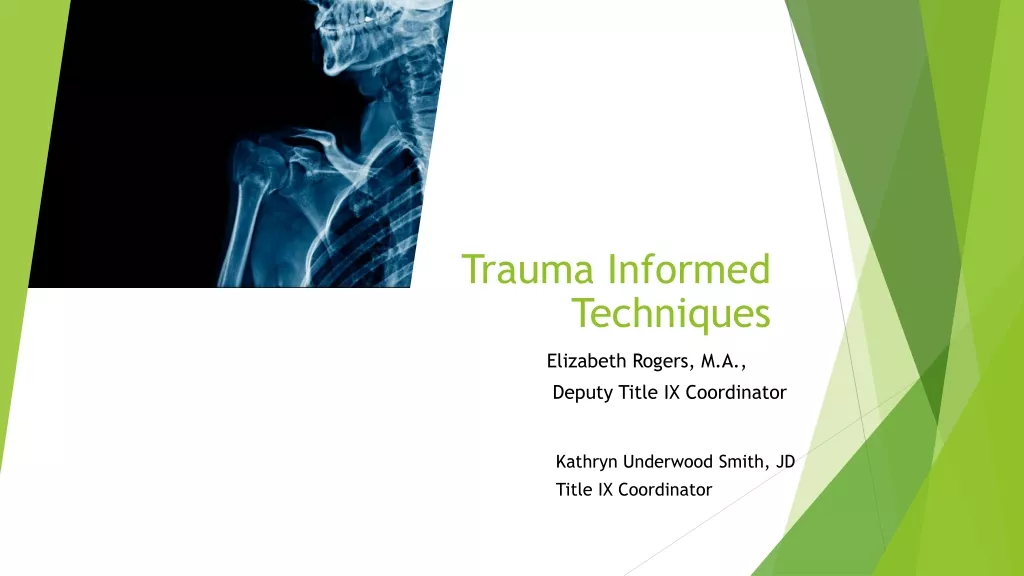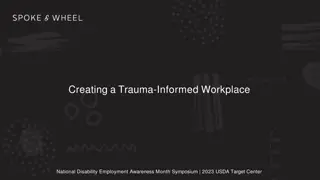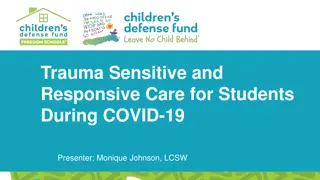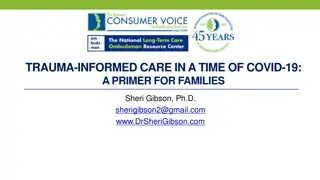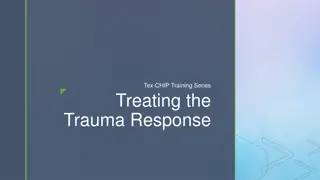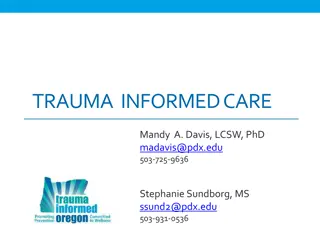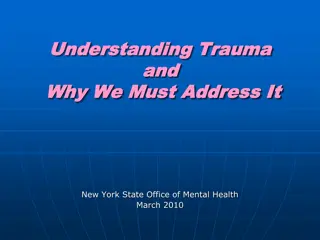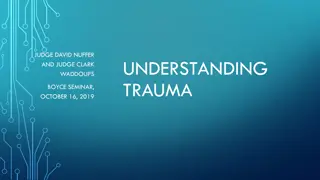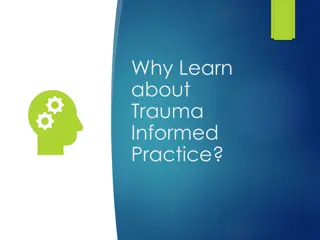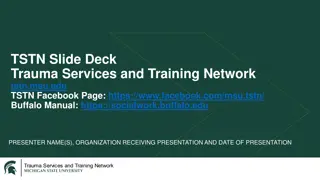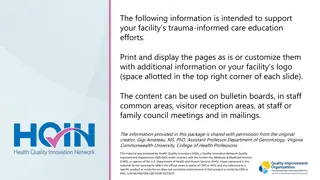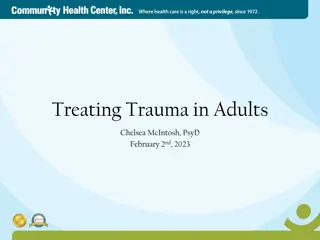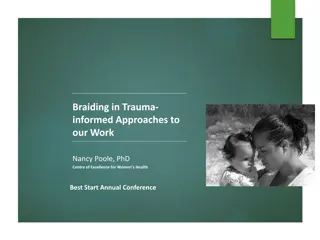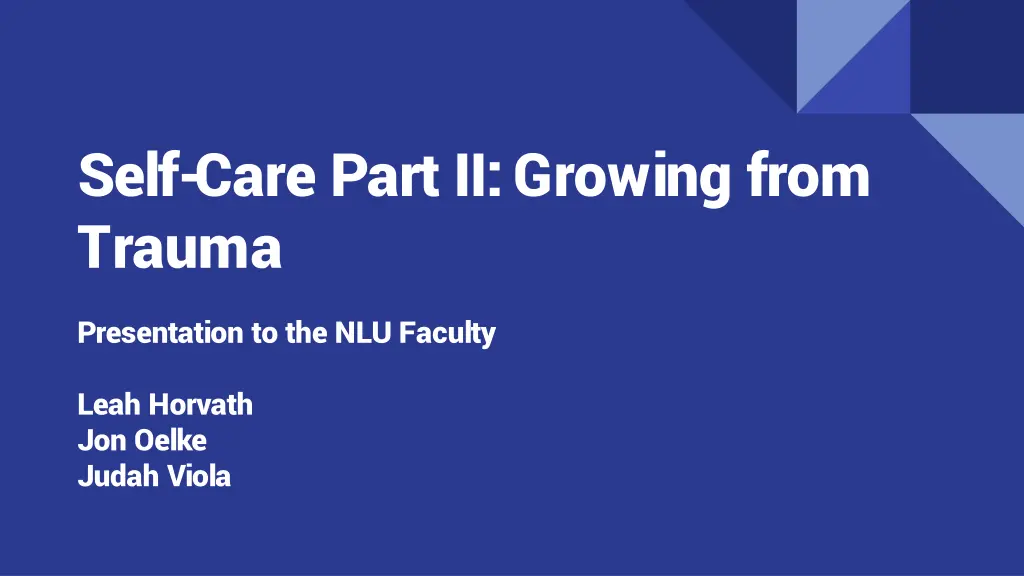
Exploring Post-Traumatic Growth: Moving Forward from Trauma
Delve into the concept of post-traumatic growth as a transformative process following traumatic events. Understand the impact of trauma on cognition, narrative, and the philosophy of growth after adversity. Join Leah Horvath, Jon Oelke, and Judah Viola in a journey towards self-discovery and resilience.
Download Presentation

Please find below an Image/Link to download the presentation.
The content on the website is provided AS IS for your information and personal use only. It may not be sold, licensed, or shared on other websites without obtaining consent from the author. If you encounter any issues during the download, it is possible that the publisher has removed the file from their server.
You are allowed to download the files provided on this website for personal or commercial use, subject to the condition that they are used lawfully. All files are the property of their respective owners.
The content on the website is provided AS IS for your information and personal use only. It may not be sold, licensed, or shared on other websites without obtaining consent from the author.
E N D
Presentation Transcript
Self-Care Part II: Growing from Trauma Presentation to the NLU Faculty Leah Horvath Jon Oelke Judah Viola
Previously on Self-Care with Leah and Jon Defining self-care Thinking through barriers to self-care Building your resilience toolkit Setting Boundaries Mindfulness Self-compassion Today, we re going to focus on trauma and giving ourselves space to move through that trauma.
Trauma--Broadly defined Threat to cognitive or psychological integrity-- a severe challenge to individuals past ways of understanding the world and their place in it, their personal identity.
Trauma & Cognition Challenging or shattering the assumptive world or core beliefs about benevolence safety predictability controllability vulnerability self-esteem morality (moral injury)
Trauma and narrative Trauma is often a turning point in our life narrative, a watershed event. Events are traumatic when they disrupt the anticipated course of life or the plan people had for their lives. If an event divides life into before and after it may be traumatic, and also, growth-enhancing.
Post Traumatic Growth (PTG) Posttraumatic Growth is both a process and an outcome: The experience of positive changes in oneself as a result of the struggle with traumatic events. Changes are transformative and involve changes in perspective.
Philosophy of PTG There is a sense of possibility for growth in the aftermath of trauma Paradigm shift to living with past experiences vs. extinguishing them People see themselves as suffering not because of character defects, but because of what happened; relieves shame & self-stigma PTG model posits that in order to facilitate PTG, trauma survivors will benefit from expert companionship; the process is common and often occurs naturally
Examples of PTG A soldier who lost his friend during a convoy I struggled with Dave s death for a long time. I still struggle with it. But I look at my daughter, my wife, my home and I feel appreciative. I m sad that he died, but because of his death I no longer take things for granted and I cherish so many things in my life. Dave gave this gift to me.
A bereaved mother Before Roberto s death I often said that family was my priority. I believed that, but my actions didn t always show it. Now, family is a priority in my heart, head, and in my actions. I am there for my other children and my husband. Not a day goes by that I don t grieve for my beautiful boy, but not a day goes by that I don t thank him for giving me perspective and making our family stronger. We all love each other deeper and can love deeper I love deeper because of him.
5 Steps typically involved 1. Appreciating and using dialectical thinking. 2. Constructing meaning. 3. Seeking, finding, reminding, and constructing benefits for oneself and others. 4. Establishing and maintaining a future orientation with altered priorities. 5. Constructing a coherent narrative, with purpose or meaning that transform loss into something good.
But I dont have time! If you re finding that you don t have time for self-care . why is that? Priorities? More than likely it s projects that you ve agreed to. Oh, please just join this meeting, it won t take a ton of your time. The next thing you know, you re writing a grant. How did we make this leap? Boundaries
DEAR MAN -A Strategy for Maintaining Boundaries D -Describe E -Express A -Assert R -Reinforce M -mindfully A -appear confident N -negotiate
DEAR MAN Situation Your program chair (or dean or boss or manager) has come to ask you to teach a last minute class. It s a topic that you really enjoy and you want to be helpful and maintain a good relationship with your program chair. At the same time, you are already overbooked with teaching and other professional obligations and you are the primary caregiver for an elderly parent, which means you are juggling a lot of competing demands. You worry that if you take on this class, your well-being will suffer. But you also worry that if you do not take on this class, you ll disappoint your chair and the students and you may not have the chance to teach this class again.
What to do? First, consider what your goals in this situation are: 1. Objective Goal -to say no to teaching this extra class 1. Relationship Goal -to maintain a good relationship with your chair 1. Self-Respect Goal-to feel good about yourself for upholding your boundaries and being respectful in your interaction
Describe - - Just the facts Think about the who, what, when, where of the situation Example - You asked me to teach this extra class, which is a topic I really enjoy teaching. This semester, I am teaching overload already and caring for my elderly parent.
Express - Say how you feel about the situation Example - I feel torn in this situation. I want to be seen as a good colleague and want to help out the program and the students, and I also worry that I will sacrifice my well-being if I take on additional responsibilities at this time.
Assert - - Ask for what you want or clearly say no This must be explicit and direct -no assuming the other person will guess your wants/needs Example - As much as I would like to teach this course, I am declining the request. I am not able to teach this class this semester.
Reinforce - - Offer a reinforcement or incentive to the other person Oftentimes a thank you may be enough here Example - I appreciate your understanding. I know that I ll be better able to fulfill my other course and professional responsibilities if I say not to taking on this extra class.
MAN -the how skills Be Mindful -this is a reminder to stay focused on the topic at hand. Sometimes when people don t like the request we are making or the ask we are refusing, they may try to change the topic. This is a reminder to be a broken record and keep coming back to the topic. Appear Confident -even if you feel very nervous about making your request or saying no, do your best to appear confident. The more prepared you are -the easier this will be (do your homework first) Negotiate -you may need to be willing to give a little to get. Be open to negotiating to get your needs met.


